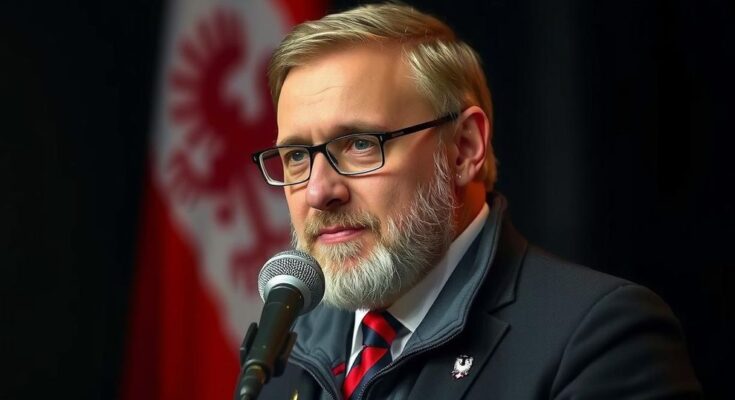Rafał Trzaskowski has been chosen as the Civic Coalition’s candidate for the 2025 presidential election, receiving overwhelming support in a primary election. He previously ran in 2020, narrowly losing to the incumbent. Known for his liberal views on LGBT+ and women’s rights, Trzaskowski’s candidacy marks a significant moment in Poland’s political landscape as the opposition prepares to challenge the ruling Law and Justice party.
Rafał Trzaskowski, the Mayor of Warsaw, has been nominated by the centrist Civic Coalition (KO) to be its presidential candidate for the 2025 election. Securing approximately 74.75% of the votes in a primary held electronically, Trzaskowski triumphed over Foreign Minister Radosław Sikorski, who subsequently expressed his support for Trzaskowski’s candidacy. Known for his socially liberal stance, Trzaskowski has advocated for LGBT+ and women’s rights and previously finished a close second in the 2020 presidential election.
Donald Tusk, the head of the Civic Platform party, emphasized the democratic nature of their primary process, contrasting it with the more centralized candidate selection approach of the ruling Law and Justice party (PiS). While PiS is anticipated to announce its candidate soon, they decided against holding primaries. In remarks following his nomination, Trzaskowski highlighted the democratic participation of over 22,000 KO members, asserting, “In PiS, one vote will decide; in our case, 22,000 people decided.”
Trzaskowski’s victory set the stage for a presidential campaign he aims to approach differently than in 2020, citing the absence of a pro-incumbent propaganda machine from state media, which had supported PiS in the last election. Having been re-elected as Warsaw’s mayor with 57.4% of the vote this year, Trzaskowski’s position reflects significant support in Poland’s capital, known for its liberal values.
His policies as mayor, including a controversial ban on religious symbols in city hall, have drawn scrutiny and are expected to feature prominently in the upcoming election discourse. Additionally, Trzaskowski has committed to advocating for women’s rights, particularly concerning Poland’s restrictive abortion laws introduced under PiS. As the political landscape evolves, the upcoming presidential election is poised to be a notable battle between the centrist KO and the more conservative PiS.
In the context of Polish politics, the Civic Coalition (KO) represents a significant centrist force, contrasting with the national-conservative Law and Justice party (PiS), which is currently the largest in parliament. KO’s recent decision to endorse Rafał Trzaskowski as its presidential candidate follows a contentious 2020 election where he narrowly lost to incumbent Andrzej Duda of PiS. The upcoming 2025 elections represent a critical juncture for Polish politics, as voters navigate issues surrounding liberal values and social policies under the influence of the current government. The ability of opposition coalitions to unite their base and present a viable alternative to the ruling party will be crucial in shaping the outcome.
The selection of Rafał Trzaskowski as the Civic Coalition’s presidential candidate signifies a proactive effort to advocate for socially progressive policies as Poland approaches the 2025 elections. His past experience and platform, particularly emphasizing human rights, could bolster his appeal against the backdrop of a politically divided nation. The support from within KO reflects a commitment to democratic processes, as highlighted by Donald Tusk, potentially positioning them favorably among voters disillusioned with the ruling party’s governance.
Original Source: notesfrompoland.com




